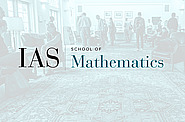Seminars
Apr
13
2015
Computer Science/Discrete Mathematics Seminar I
A new approach to the sensitivity conjecture
11:15am|S-101
Apr
07
2015
Computer Science/Discrete Mathematics Seminar II
Interleaved products in special linear groups: mixing and communication complexity
10:30am|S-101
Apr
06
2015
Computer Science/Discrete Mathematics Seminar I
Natural algorithms for flow problems
Nisheeth Vishnoi
11:15am|S-101
Mar
31
2015
Computer Science/Discrete Mathematics Seminar II
Kolmogorov width of discrete linear spaces: an approach to matrix rigidity
10:30am|S-101
Mar
30
2015
Computer Science/Discrete Mathematics Seminar I
Intelligent learning: similarity control and knowledge transfer
Vladimir Vapnik
11:15am|S-101
Mar
24
2015
Computer Science/Discrete Mathematics Seminar II
Tractability as compressibility
Dimitris Achlioptas
10:30am|S-101
Mar
23
2015
Computer Science/Discrete Mathematics Seminar I
Random walks that find perfect objects and the Lovász local lemma
Dimitris Achlioptas
11:15am|S-101
Mar
17
2015
Computer Science/Discrete Mathematics Seminar II
Average-case lower bounds for formula size
10:30am|S-101
Mar
16
2015
Computer Science/Discrete Mathematics Seminar I
Tight hardness of the non-commutative Grothendieck problem
11:15am|S-101
Mar
10
2015
Computer Science/Discrete Mathematics Seminar II
Chernoff bounds for expander walks
10:30am|West Bldg. Lect. Hall
